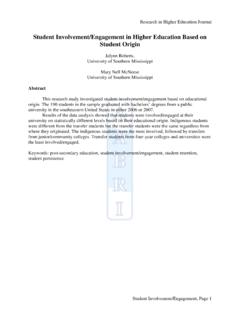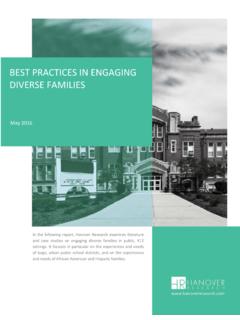Transcription of Assessment in Higher Education and Student Learning
1 Journal of Instructional Pedagogies Volume 21. Assessment in Higher Education and Student Learning Dr. Rawlusyk Red Deer College, Red Deer, AB, Canada ABSTRACT. This research addressed ongoing academic concerns about whether Assessment practices in Higher Education support Student Learning . Authors state that examinations have become the focus of Assessment , which adversely affect Learning . Effective Assessment for Learning promotes the active engagement of students . A web-based survey gathered information from a sample of postsecondary educators in Alberta. The questionnaire used the three criteria of Learning -oriented Assessment , tasks as Learning tasks (authentic), self- and peer Assessment , and feedback to determine Learning potential. Findings illustrated that the implementation of only three of 15 authentic tasks occurred by over 30% of educators.
2 Results also found that teachers have conflicting views relative to Student use of feedback and the use of dialogue. These outcomes show that there is limited involvement of learners in Assessment strategies, which can impact Learning . It is recommended that teachers utilize professional development to understand how to optimize the active participation of students in various authentic Assessment methods and feedback. Future research using a qualitative design should be conducted to obtain reasons why Assessment problems exist. Keywords: Assessment , Learning -oriented Assessment , feedback, authentic Assessment , self- Assessment , peer Assessment , active Learning Copyright statement: Authors retain the copyright to the manuscripts published in AABRI. journals. Please see the AABRI Copyright Policy at Assessment in Higher Education , Page 1.
3 182875 Journal of Instructional Pedagogies INTRODUCTION. Educators and educational leaders have continually debated Student Assessment in Higher Education (Boud & Falchikov, 2007; Carless, 2015; Gilles, Detroz, & Blais, 2011). Academics expressed concern that the methods used to assess students are not linked to Student Learning (Carless, 2014; Douglas, Wilson & Ennis, 2012; Trevalyan &. Wilson, 2012; Webber, 2012). Ongoing discussions center on such topics as whether a Student 's success in examinations relates to high standards, what Assessment tasks are best for Learning , whether Assessment practices promote lifelong Learning , and how feedback could help improve Student progress (Carless, 2015). Investigators identified that teachers do not always link Assessment with quality teaching (Postareff, Virtanen, Katajavuori, & Lindblom-Yl nne, 2012).
4 Instead, they view Assessment as a practice that signifies evaluation and the formation of grades (Sambell, McDowell, &. Montgomery, 2013; Torrance, 2012). However, authors suggest that Assessment can be an important tool for active Learning in the classroom (Bonwell, 2010; McGinnis, 2018). Despite the many articles written on Assessment practices that promote Learning , academics appear to rely on traditional pen and paper examinations to determine Student knowledge (Carless et al., 2010; Duncan & Buskirk-Cohen, 2011; Gilles et al., 2011; Postareff et al., 2012). Authors state that testing is a passive process, which adversely influences Learning (Ertmer & Newby, 2013). A possible cause of this problem is the lack of awareness regarding Assessment methods used across the various postsecondary institutions (Gilles et al.)
5 , 2011; Postareff et al., 2012; Webber, 2012). This research brings awareness to Assessment practices in Higher Education . Only with awareness, will instructors learn the value of Assessment , its effect on Learning , and be capable of making changes (Postareff et al., 2012). LITERATURE REVIEW. Assessment refers to a variety of tasks by which teachers collect information regarding the performance and achievement of their students (Gronlund, 2006). Researchers emphasized that Assessment has two main purposes. One reason is for Student Learning and the second is for certification, which involves the evaluation of Student achievement (Carless, 2015; Norton, Norton, & Shannon, 2013). Authors affirmed that formative and summative Assessment fulfill these purposes (Carless 2015; Saifi, Mahmood, Gujjar, & Ali Sha, 2011.
6 Sambell et al., 2013). When Assessment is successful, these two functions need to overlap (Carless, 2007). Formative Assessment occurs on a continuous basis throughout the course (Saifi et al., 2011; Sambell et al., 2013). It encourages students to engage in the subject matter, which helps them become familiar with the information they are attempting to learn (Jacoby, Heugh, Bax, & Branford-White, 2014). For effective formative Assessment , active participation of the Student and teacher occurs (Jacoby et al., 2014). When students are actively engaged in the activities, it results in deeper thinking and long-term retention of learned concepts (McCoy, 2013, p. 146). Improvements in learners' performances are achieved through supportive feedback from various Assessment tasks (Sambell et al., 2013). Because of its value to Learning , formative Assessment is considered Assessment for Learning (Carless, Joughin, & Lui, 2010; Hern ndez, 2012; McDowell, Wakelin, Montgomery, &.
7 King, 2011). Summative Assessment is used for judging Student achievement and occurs at the end of a course or phase of instruction (Gronlund, 2006). Gibson and Shaw (2011) say that common methods used for summative Assessment include unit tests, exams (midterm, Assessment in Higher Education , Page 2. 182875 Journal of Instructional Pedagogies semester), and final presentations or projects. However, the timing of these practices makes it difficult to modify Student Learning . Therefore, they are used only to determine grades. Because of this, summative Assessment is referred to as Assessment of Learning (Hern ndez, 2012; McDowell et al., 2011). Still, Carless et al. (2010) noted that summative Assessment could be formative and for Learning if there is feedback given that helps students learn. In Higher Education , most Assessment strategies, such as course assignments, serve both a formative ( Assessment for Learning ) and a summative ( Assessment of Learning ) function (Hern ndez, 2012; Taras, 2009).
8 Assessment FOR Learning . Assessment for Learning (AfL) follows the principle that all Assessment strategies promote Student Learning (Sambell et al., 2013). Some features of AfL include the presence of authentic Assessment (McDowell et al., 2011; Sambell et al., 2013). Also, students must engage in the Learning process and not focus on marks (Sambell et al., 2013). There should be an opportunity for learners to practice previously learned skills or knowledge (Sambell et al., 2013). Feedback needs to combine written comments and dialogue between the Student , classmates, and teacher (McDowell et al., 2011; Sambell et al., 2013). Lastly, AfL assists in the development of independent learners (McDowell et al., 2011). These traits of AfL are characteristic of the cognitive theory of constructivism. From a constructivist view, teachers make sure there is active involvement of learners in the Learning process (Paily, 2013; Schwetzer & Stephenson, 2008).
9 Activities such as collaboration, real-world examples, and self-reflection characterize constructivism (Paily, 2013). Social constructivism incorporates others into the constructivist approach (Paily, 2013). The use of dialogue focuses on the sharing of ideas through collaboration and cooperation (Paily, 2013). Through engagement and interaction, knowledge and understanding develop (Torrance, 2012). This interaction occurs between teacher and Student , Student and Student or Student and task (Torrance, 2012). This theory also supports the idea that learners' experiences generate knowledge (Schreiber & Valle, 2013). Learning -oriented Assessment Learning -oriented Assessment (LOA) is a concept that represents Assessment for Learning (Carless, 2015). Learning -oriented Assessment is a multisource method that promotes Student Learning for the present and the future (Carless, 2015).
10 It consists of three interlocking criteria, tasks as Learning tasks, self- and peer Assessment , and feedback (Carless, Joughin, & Mok, 2006; Carless, 2015). Each component of LOA encourages students to become involved in the Assessment process. Active participation allows students to focus on creating knowledge with an emphasis on skills such as analytical thinking, problem-solving and meta-cognitive activities that develop students ' thinking (Demirci, 2017, ). Tasks as Learning Tasks For tasks to promote Learning , an essential feature is their authentic quality (Carless, 2015; Sambell et al., 2013). Authentic Assessment is a type of extended performance Assessment (Gronlund, 2006). Performance Assessment tasks are high in realism and complexity, can integrate ideas and skills, and result in more Learning (Gronlund, 2006).













